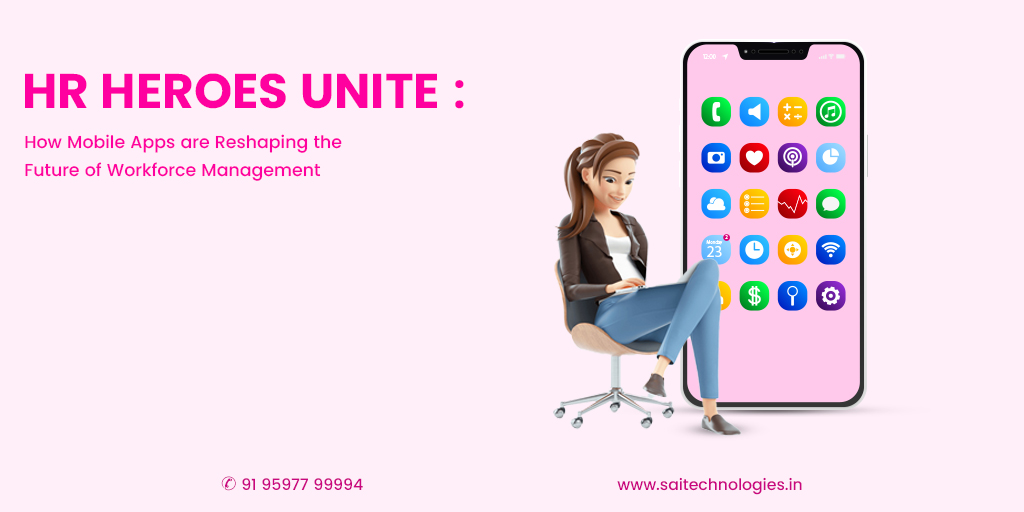HR Heroes Unite
How Mobile Apps are Reshaping the Future of Workforce Management

The digital revolution has ushered in a new era of convenience, connectivity, and efficiency. From ordering groceries to managing finances, mobile apps have transformed the way we interact with the world around us. However, the impact of mobile technology isn't confined to consumer experiences alone. In the realm of human resources (HR), mobile apps are emerging as the unsung heroes reshaping the landscape of workforce management. This article delves into how these HR heroes are revolutionizing the future of HR operations.
The Mobile Revolution in HR: A Paradigm Shift
Traditional HR operations were tethered to office desks and desktop computers. HR teams handled recruitment, employee management, and administrative tasks through manual processes. However, the rise of mobile technology has introduced a paradigm shift, liberating HR functions from the confines of the office. Mobile apps are liberating HR professionals, enabling them to manage tasks and engage with employees from virtually anywhere.
The Power of Mobile Apps in Workforce Management: A Deep Dive
-
Recruitment and Candidate Management:
Mobile apps have streamlined recruitment by enabling HR teams to review resumes, conduct interviews, and communicate with candidates on the go. This expedites the hiring process and ensures timely responses, enhancing the candidate experience.
-
Onboarding and Orientation:
New employees can now complete onboarding processes through mobile apps, accessing training materials, company policies, and necessary documentation. This accelerates the integration of new hires into the company culture.
-
Employee Self-Service:
Mobile apps empower employees to update personal information, view pay stubs, and request time off without the need for constant back-and-forth communication with HR. Employees and HR professionals can both save time by using this self-service option.
-
Attendance and Time Tracking:
Gone are the days of manual timesheets. Mobile apps allow employees to log their work hours, track attendance, and request changes in real-time. This accuracy reduces discrepancies and simplifies payroll processing.
-
Performance Evaluation and Feedback:
Mobile apps facilitate continuous performance evaluations and feedback loops. Managers can provide timely feedback, track goals, and foster employee development through these apps.
-
Learning and Development:
HR heroes now offer learning and development opportunities through mobile apps. Employees can access training modules, webinars, and skill-building resources on their devices, fostering professional growth.
Benefits of Mobile Apps in Workforce Management: Empowering HR Heroes
The adoption of mobile apps in HR operations brings forth a plethora of benefits:
-
Flexibility and Accessibility:
HR professionals can respond to inquiries and manage tasks while on the move, contributing to greater agility in HR operations.
-
Real-time Communication:
Mobile apps enable instant communication between HR teams and employees, fostering timely collaboration and issue resolution.
-
Enhanced Employee Engagement:
Engaging mobile interfaces encourages employee participation in various HR processes, from performance evaluations to skill development.
-
Improved Data Accuracy:
Manual data entry is prone to errors. Mobile apps ensure accurate data capture, minimizing data inconsistencies.
-
Efficient Task Management:
HR professionals can efficiently manage tasks, track progress, and automate reminders through mobile apps, optimizing productivity.
-
Paperless Workflows:
The shift to mobile apps reduces the need for paper-based processes, contributing to a more sustainable workplace.
Case Studies: Real-World Examples
The success stories of companies that have embraced mobile apps for HR management illustrate the transformative potential of this technology.
-
By implementing a mobile app for employee self-service, they reduced the time spent on administrative tasks by 30%, allowing HR professionals to focus on strategic initiatives.
-
Through a mobile app for performance evaluations, they improved employee satisfaction and retention by providing timely feedback and recognition.
Overcoming Challenges: Security, Privacy, and User
Adoption
As with any technological advancement, challenges exist:
Security and Privacy Concerns: Ensuring the security of sensitive HR data accessed through mobile devices is paramount. Companies must implement robust security measures to protect employee information.
User Adoption: Some employees and HR professionals might be resistant to change. Training, user-friendly interfaces, and clear communication are essential for successful adoption.
Future Trends: What Lies Ahead for Mobile-Driven HR?
The future of mobile-driven HR holds exciting prospects:
AI and Machine Learning Integration: Mobile apps will leverage AI to automate routine tasks, analyze employee data for insights, and enhance decision-making.
Predictive Analytics: Predictive analytics will play a pivotal role in forecasting workforce trends, allowing HR teams to proactively address challenges.
Continued Remote Work Influence: As remote work continues to shape the modern workplace, mobile apps will be essential for maintaining HR operations and employee engagement.
Conclusion: Embrace the HR Hero Within
Mobile apps are no longer just tools for ordering food or checking the weather; they're the HR heroes reshaping the way organizations manage their workforce. By embracing these technological advancements, HR professionals can unleash their inner heroes, contributing to efficient, engaged, and agile workplaces.
As the HR landscape evolves, one thing remains certain: the power of mobile apps in workforce management is here to stay. So, step into the future, embrace these HR heroes, and let them lead the way toward a new era of HR excellence.


